The Suffering in Gaza is Our Community’s Concern!
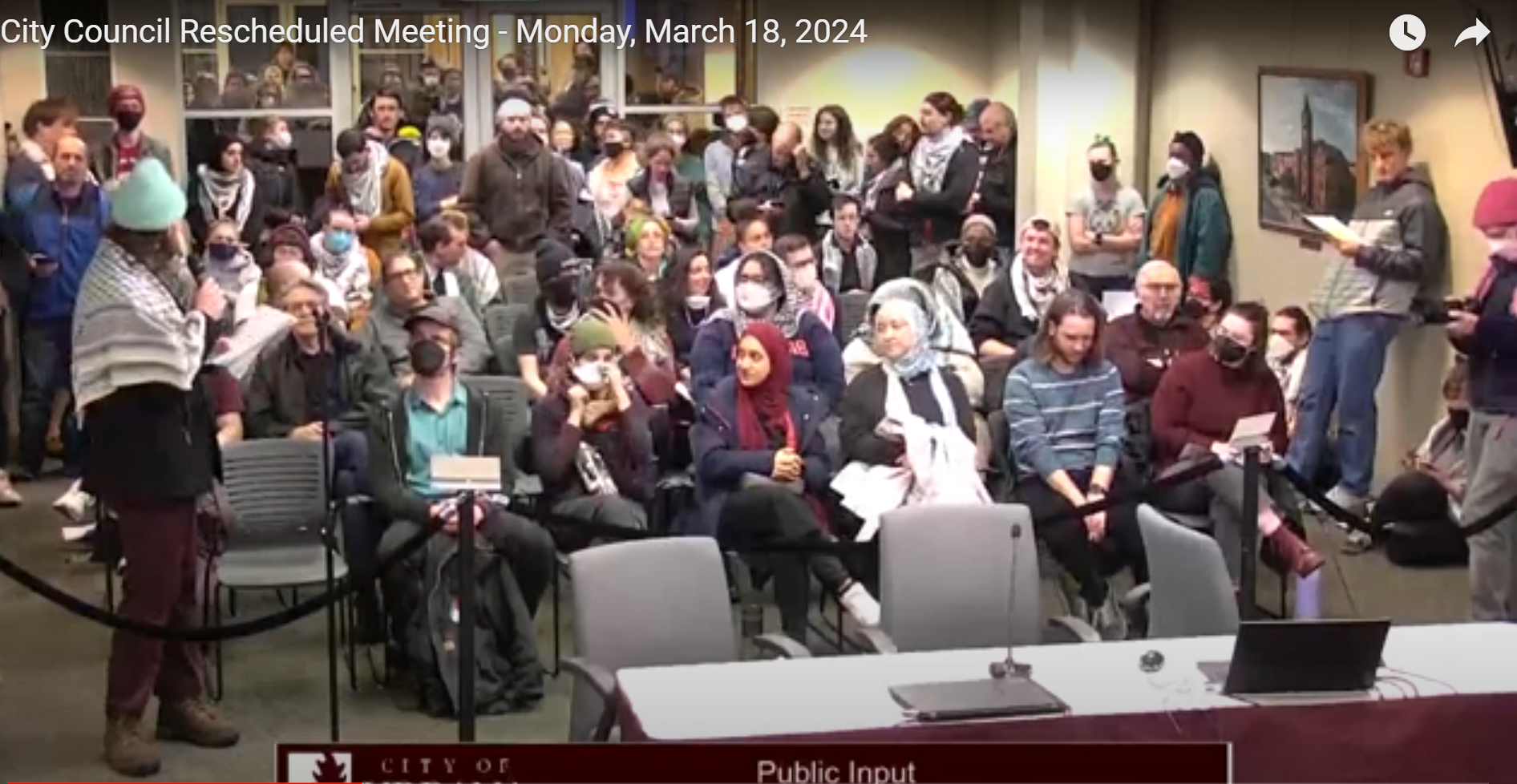
Urbana residents crowded into the City Council chambers on March 18 to give public input supporting a ceasefire resolution for Gaza
242 total views, 21 views today

Urbana residents crowded into the City Council chambers on March 18 to give public input supporting a ceasefire resolution for Gaza
242 total views, 21 views today
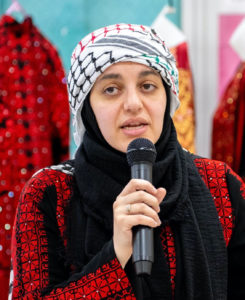
Americans have been in the streets since October 8 demanding an end to the US-backed Israeli attack on Gaza. They’re at sporting events and camping out in front of top politicians’ homes. They were at tree-lighting and caroling events over the holidays. They are at every public event President Joe Biden speaks at. They were at the Oscars. They are shutting down bridges and arms factories. They have been doing so for 180 days. Their message has been clear: no business as usual as a genocide occurs.
They have been unrelenting with three simple demands:
507 total views, 41 views today
 “The rivers are the place where nature still exists.” – Bruce Hannon, 2017 interview for Prairie Rivers Network’s 50th Anniversary.
“The rivers are the place where nature still exists.” – Bruce Hannon, 2017 interview for Prairie Rivers Network’s 50th Anniversary.
Bruce Hannon, the founder of Prairie Rivers Network (PRN), passed away on Sunday, February 18, 2024. Bruce’s accomplishments are too numerous to recount in full, but among other things he was a distinguished professor emeritus of geography; an environmental visionary; a community leader; an expert clocksmith; a beloved husband, father, grandfather and great grandfather; and a deeply kind and generous man who never stopped working to make this place better for all who live here. Continue reading
298 total views, 34 views today
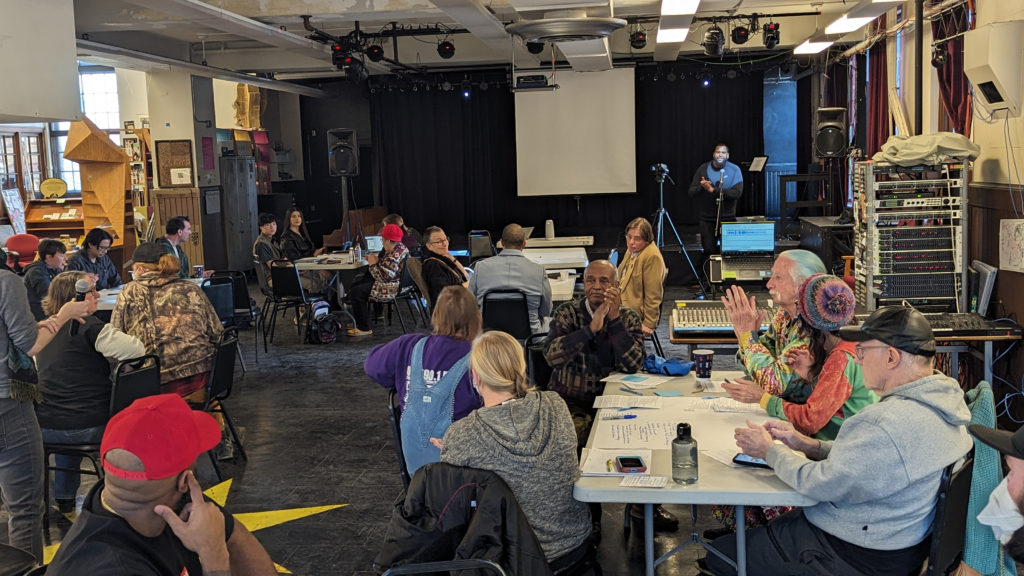
UCIMC’s second public safety forum on March 24. Photo by Prasad Packirisamy, used with permission
On March 24, the UCIMC hosted a second public safety forum focused on alternative responses to traditional law enforcement. The forum was organized in accordance with calls from Urbana residents and elected officials for a study of alternatives to traditional policing in the wake of George Floyd’s murder in the summer of 2020 and a violent skirmish between a young, unarmed Black woman and police in Urbana in 2021. Continue reading
348 total views, 32 views today

A version of this article originally appeared on IPM Newsroom on February 5, 2024. It has been edited for space and style. See the full version on the Public i’s website. This story is part of a partnership between the Champaign-Urbana Civic Police Data Project of the Invisible Institute and IPM Newsroom, and was supported with funding from the Data-Driven Reporting Project.
After Rantoul’s first-ever fatal police shootings in 2023, the Rantoul Police Department (RPD) conducted internal reviews of both incidents.
In those internal reviews, the Use of Force Review Board—made up of different members in each incident—recommended further training for both the department and individual officers after absolving all but one officer of wrongdoing in both cases: the February, 2023 shooting of Azaan Lee, and the June shooting of Jordan Richardson.
The RPD’s Use of Force Review Board recommended department-level trainings, including reality-based training under stress; “force-on-force” training; using control tactics from multiple positions; and a “refresher” on RPD’s use-of-force policy. However, the department has not implemented any of these trainings. Continue reading
315 total views, 35 views today

Broken furniture and fixtures outside the former Champaign County Nursing Home which William “Avi” Rothner purchased in 2018. Photo by Farrah Anderson for CU-CitizenAccess, used by permission
In 2018, the Champaign County Board sold the Champaign County Nursing Home. In 2023, that facility was shut down by the private market entity that bought it. In five short years, our once-publicly run elder care facility was commodified, gutted, and closed.
This outcome, devastating for our community, was a predictable one. Residents warned the county government years ago that offloading this public service to the profit-driven market was doomed to fail. Despite the prescience of our community, the majority of Champaign County Board members voted to sell the nursing home. Continue reading
309 total views, 34 views today
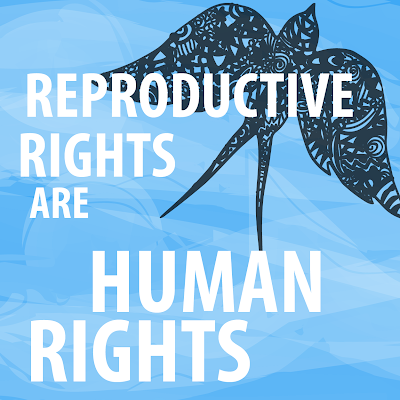
The human right to choose to have children or not to have children is a foundational principle in the vision of Reproductive Justice (RJ). Thus the increase in legal attacks on abortion rights and trans rights is understandably central to the current struggle for bodily autonomy by activists. When the Supreme Court’s Dobbs v. Jackson decision overturned Roe v. Wade in June, 2022, the issue of abortion once again exploded onto the national spotlight. The loss of federal protections for abortion was devastating, but in reality the anti-abortion movement had already successfully limited access for millions. As a result of TRAP (Targeted Regulation of Abortion Providers) laws, by 2022 six U.S. states were down to only one abortion clinic. As of today, 24 states have limited abortion, 14 of which have implemented near-total bans.
Mobilization after the fall of Dobbs was initially phenomenal. So-called “rage” donations infused abortion funds with millions of dollars (though there has been a subsequent drop-off). New abortion clinics opened in pro-abortion states, often near state borders. Urbana-Champaign’s Planned Parenthood resumed providing procedural abortions, and Equity Clinic, an independent abortion clinic, opened in Champaign. Carbondale now has three abortion clinics, up from a single clinic pre-Dobbs. And new organizations like Elevated Access stepped up as well, helping people travel to access health care now illegal in their home states. Continue reading
85 total views, 1 views today

ABAAD – Resource Center for Gender Equality, which the author’s project cooperates with, produced this toolkit for integrating feminist perspectives into development work
Forty-one years ago when we organized the Common Differences conference on the UI campus, I was a young professor, already quite engaged in women’s issues, which had led to my research, writing, travels, and overall commitment.
When I retired from the University of Illinois, I felt it was not enough to be writing, researching, and teaching on the subject. I needed to get involved concretely in the field, and in 2009 I joined my sister Jacqueline Hajjar in Beirut to open a center for abused women. We both put our savings into purchasing an apartment in the city center, and it has been functioning since then, welcoming about 12 women, sometimes with their children: sheltering and feeding them; providing physical, psychological, and spiritual healing; and helping them rebuild their lives and gain independence through education and instruction in trades. We have received more than 500 women over the years, some of them with spectacular healing stories, some of whose testimonies I have gathered in one of my latest books (which the women themselves asked me to write). Continue reading
53 total views

Local Canada geese
Spring is a good time to consider the giant Canada goose and methods of population control that are legal and humane.
Canada geese (Branta canadensis maxima), like all waterfowl, are protected at the federal level by the Migratory Bird Treaty Act. At the state level, Canada geese are also protected by the Illinois Wildlife Code. It is illegal to kill or remove geese, or to destroy, move, or disturb their active nests, eggs, or young, unless you register with the Illinois Department of Natural Resources (IDNR). Continue reading
56 total views
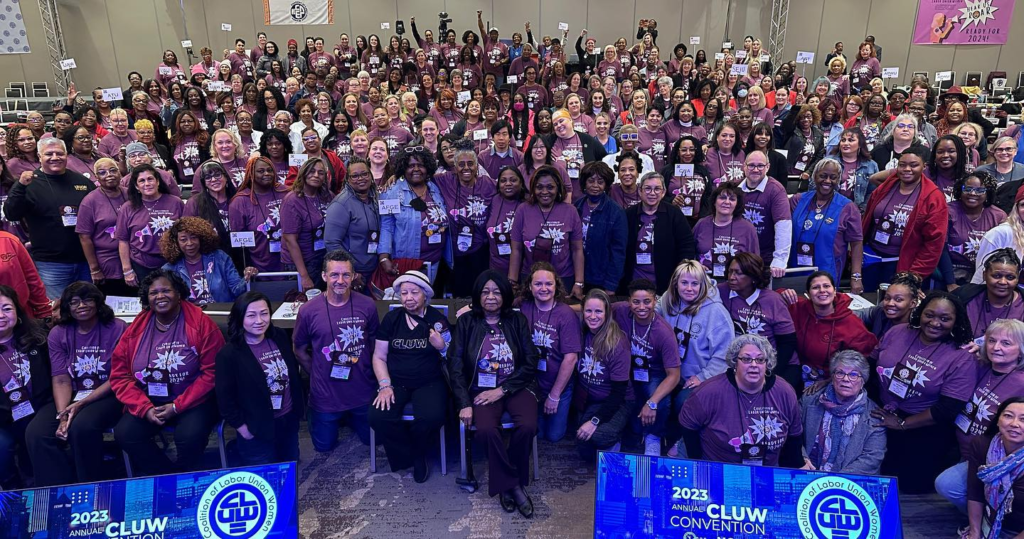
CLUW’s 2023 national convention
On the evening of March 27 more than 30 people representing about a dozen labor unions and community groups gathered at the Plumbers Local 149 Union Hall in Savoy to launch a chapter of the Coalition of Labor Union Women (CLUW) for east central Illinois. Attendees enjoyed tacos and quesadillas from the Maize food truck; celebrated Women’s History Month by learning a little about local labor women’s history; displayed historical photos, banners, charters and other materials from their unions; and held a conversation about issues facing local union women.
The idea for a local CLUW chapter started with a handful of labor women, who met over the winter to plan the March launch. It was a fitting time to start the CLUW East Central Illinois Chapter: during the 50th anniversary month of the founding of the national CLUW organization. Continue reading
54 total views
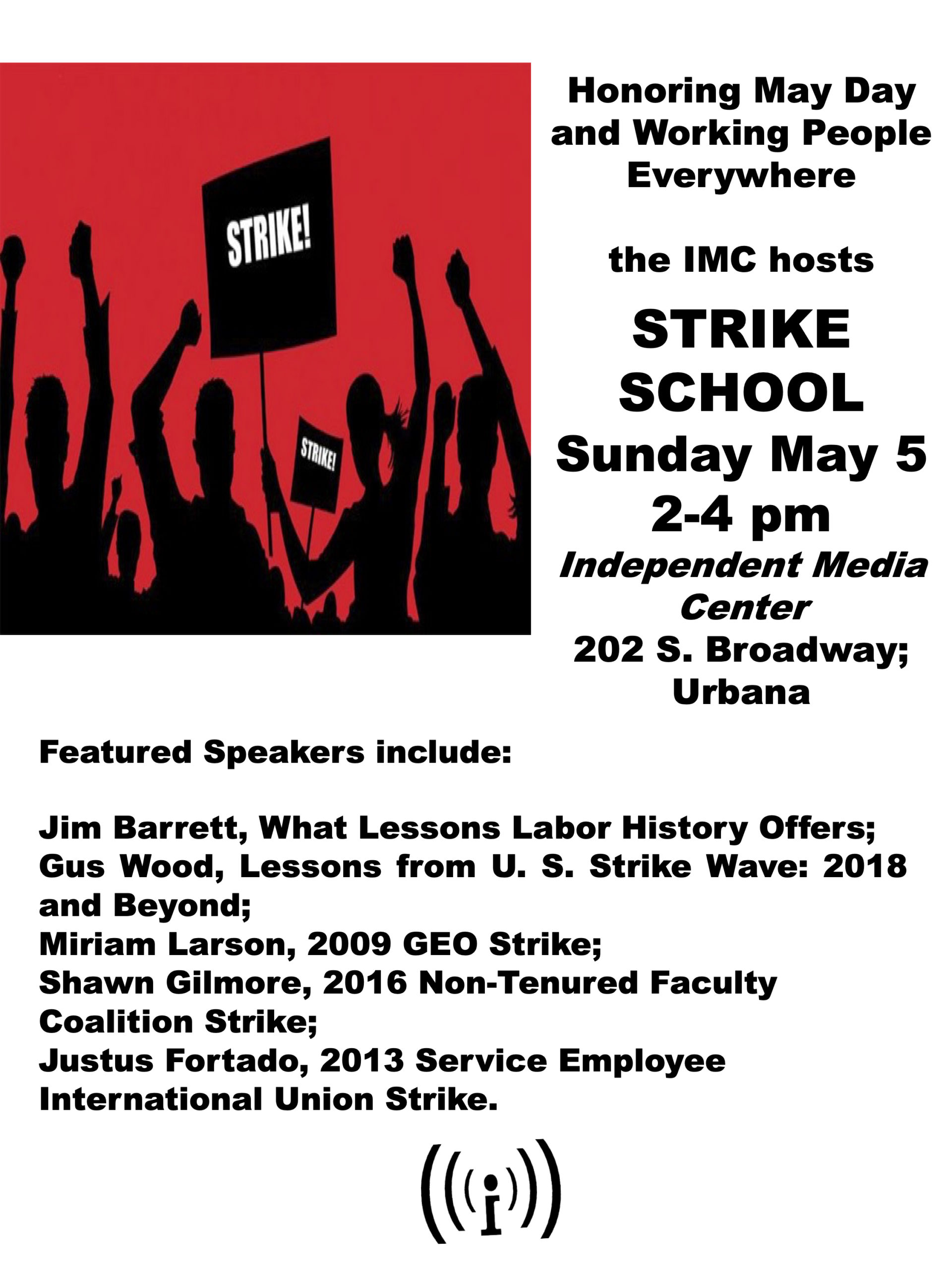
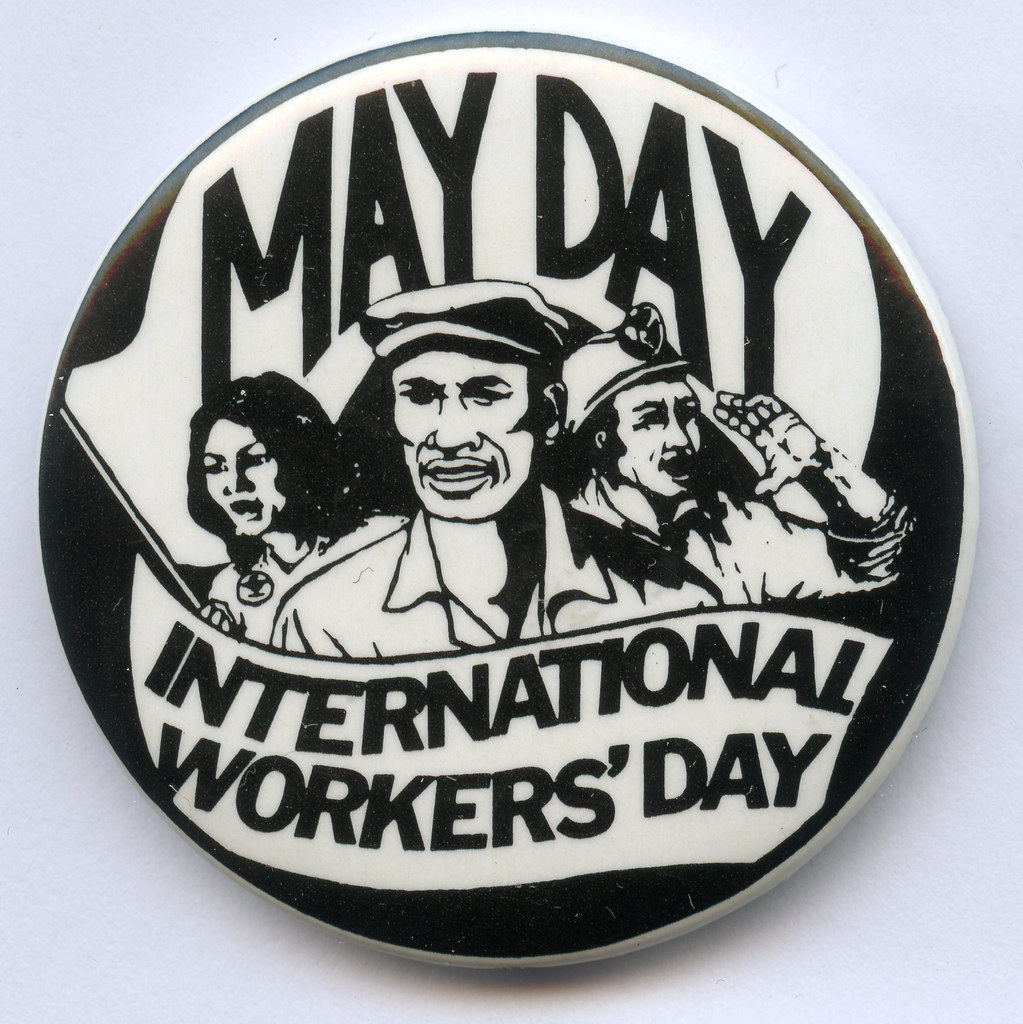
59 total views, 2 views today

Image by Adrian Meadows for Fine Acts, used under
Creative Commons License CC BY-NC-SA 4.0 DEED
476 total views, 1 views today

Union officials in early 1865 promised slaves “forty acres and a mule” upon their emancipation, but never followed through. Photo courtesy Library of Congress, used by Creative Commons License CC0 1.0 DEED View public domain image source here
According to the Descendants Truth and Reconciliation Foundation, Black people in America own 10 cents of wealth for every dollar a white person owns, have lower life expectancies and higher unemployment, will earn $1 million less during their lifetimes, are 40 percent less likely to own a home, and are five times more likely to be imprisoned.
How Did We Get Here?
There are a couple of typical reactions when hearing of such stark differences in status and well-being between Black and white people. One can be described as a combination of defensiveness, denial, minimalization, and deflection. This reaction might include statements such as “it is because of the breakdown of the Black family” or “the lack of good Black role models,” or “a poor work ethic.” After all, slavery was so long ago that it surely has no impact on the ability of African Americans to be just as successful as Caucasian Americans today, right? Continue reading
234 total views, 1 views today

Champaign County Clerk and Recorder Aaron Ammons and Illinois State Rep. Carol Ammons (D-Urbana) examine land records
Can you imagine, as a resident of Champaign County, being told you aren’t allowed to live in a neighborhood because you’re Black? By today’s standards, such blatant racism would be met with disgust and rejection—at least by the majority of us.
But if you’re a student of history; you know about the torturous, inhumane treatment of Black people in this country through what is known as the transatlantic slave trade. You’ve read about the weaponization of laws after that period, resulting in the Jim Crow era of organized racism in the form of legal barriers to equality and terrorism committed against Black people by groups like the Ku Klux Klan. So when you hear that a resident couldn’t live on some properties throughout Champaign County, surely you imagine the age of Abraham Lincoln—a time long ago.
You would be wrong. Continue reading
643 total views

How Do We Define the “Black” Church?
In some sense, the Black Church can be readily defined by its music, style of preaching and sounds. Yet these are only surface definitions—it is so much more. The Black Church was born in enslavement and represented our first true freedom movement; it was a space where enslaved Africans blended indigenous African practices with the version of Christian text which was given to them.
At its formation, the Black Church was an underground, counter-cultural, fugitive formation of enslaved Africans who rejected the social and religious construction of the slaveholding world. The Black Church was and should unequivocally be, in the words of Dr. Vincent Lloyd, the “church of the field negro”: a courageous and bold rejection of a world tethered to white supremacy. It was the Invisible Institution, which provided a hush harbor for Africans held in chattel slavery and free Africans still treated as second-class citizens in America.
This Invisible Institution was the primary source of resistance for Africans in America. This reclaiming of the Christian tradition enabled Black folks to resist chattel slavery in both passive and active ways. Continue reading
179 total views
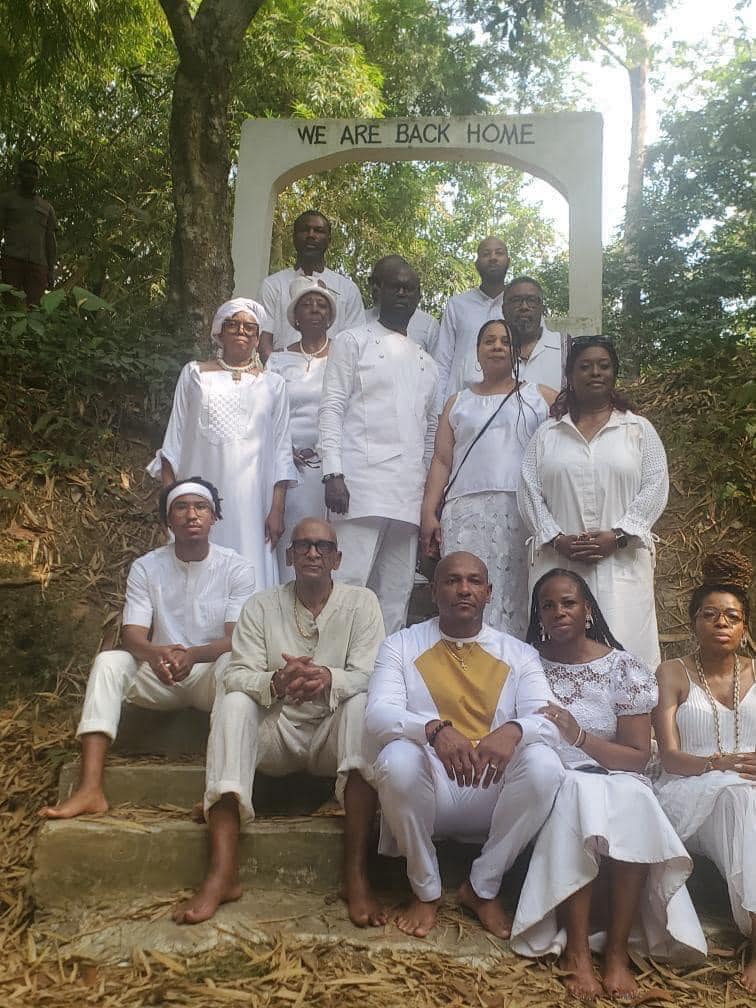
IL Representative Carol Ammons with a group of Illinois Legislative Black Caucus members and Champaign County Clerk Aaron Ammons after Rep. Ammons was crowned Queen Mother Aguadze of Kéta in the Volta Region of Ghana—a historic first for an African American. Photo courtesy Carol Ammons
“Visiting Ghana had a significant impact on me, both personally and professionally. It solidified my perspective on the importance of building bridges between African nations and the African diaspora. My visit home inspired me to integrate these newfound insights into my legislative work, such as [IL] House Resolution 453 Family Roots Genealogy Pilot Program. HR 453 seeks to reconnect people of African descent with African ancestry by using genetic genealogy to identify both reference and living African relatives. It also allows those who were separated from their ancestral homeland to find possible living relatives in their ethnic homeland.” (Carol Ammons)
For the descendants of Africans who were enslaved by colonial powers, family history might only be traceable back to the Middle Passage of the transatlantic slave trade. Even then it is often impossible to trace their family trees, since births and sales of the enslaved were poorly documented, marriages often unrecorded, and fathers unacknowledged. Thanks to the genomic revolution, private corporations offer the ability to restore these lost family trees or give an estimate of ethnicity. Using a sample of saliva, researchers can estimate ethnicity and find relatives not only in the US, but an ocean away, and (depending on the service) provide a platform to message consenting relatives. All this if an individual can pay the asking price of $99 or higher.
Illinois State Representative Carol Ammons (D-Urbana) went through this journey. She had her DNA tested by two companies, a common occurrence for genealogy consumers. Her quest for reconnection with her own family history saw her visit Ghana, where test results showed she had relatives. This experience caused Ammons to wish other African descendants could have the same experience without paying a private corporation. As it was the US government that profited from slavery, Ammons believes the government should pay for individuals to access this new tool to restore family histories. Continue reading
707 total views

F-House at Stateville Correctional Center, the last panopticon-style prison building in the U.S., seen in October 2018
Criminalization, abolition, and prison reform have long been third-rail issues in America. The only benefit to this impasse of ideologies is the mountain of research that has been collected in the interim.
Those of us in camp reality, camp humanity, have long known the roots of these problems—and now we have the proof. A collection of federal studies has found that youth who witness or are direct victims of violence, are raised without the full support of both parents, or do not have access to quality education have a much higher risk of justice-system involvement later in life. The inverse is also true. Continue reading
193 total views

The author receiving the Generation Next Leadership Award from the Illinois Legislative Black Caucus Foundation in February
Nineteen-year-old Shamar Betts of Urbana had no previous criminal record when he was arrested for “inciting a riot” via a Facebook post he wrote after witnessing the video of George Floyd’s murder in 2020. He was sentenced to three years in federal prison and made responsible for all the property damage and theft ($1.68 million) committed across town during that time of national anger. This second excerpt (the first appeared in the November/December 2023 Public i) from his forthcoming memoir describes how he supported himself while in United States Penitentiary Hazelton.
You need people outside jail for money. You call your people outside and ask them to put money on your account so you can go buy your stuff. They have underwear and socks for free, but not toiletries. You have to buy those. And there are other things people want or have to pay for. If you want the cell with a TV view, you maybe pay $2500. Or you might just need to pay for people to leave you alone.
Since my people weren’t really able to help me, I had to do things on my own. In the county jail I had a job in the laundry, so I could earn a little money ($1 an hour) for the things I needed. In the federal jail I did need some money from outside, but I also tried to make the money I needed. I never had a job given to me, but I had jobs I made up myself. For example, I used to cook. I’d make cheesecake and then go out and sell it at chow. I could make twenty-five dollars from a cheesecake. Continue reading
496 total views, 1 views today

A version of this article originally appeared on IPM Newsroom on January 9, 2024. It has been edited for space and style. See the full version on the Public i website.
This story is part of a partnership between the Champaign-Urbana Civic Police Data Project of the Invisible Institute and IPM Newsroom, and was supported with funding from the Data-Driven Reporting Project.
When Timothy Tyler applied for the Champaign Police Chief position in 2022, the city council was given his “resumes and cover letters and recommendations—things of that nature,” according to councilmember Davion Williams. Documents suggest the council was not privy to a more detailed accounting of Tyler’s policing history, which is marked by a trail of disciplinary actions and other incidents ranging from suspensions for “unfavorable” conduct to entanglements in several federal civil rights lawsuits. After receiving questions about Tyler’s background from a reporter, Williams forwarded the email to City Manager Dorothy Ann David, and asked, “Were we aware of these incidents as a city?”
Several of the investigations into Tyler’s misconduct led to settlements and disciplinary action. Among those: an off-duty domestic incident with an ex-girlfriend and an improper vehicle pursuit that ended in a crash outside of Chicago Police headquarters. In addition, civil rights lawsuits accused him of false arrest and conspiring with city officials to illegally shut down a nightclub. Continue reading
295 total views